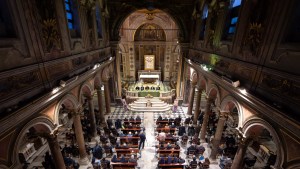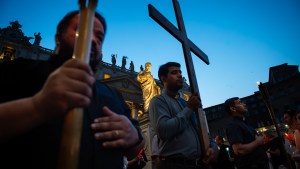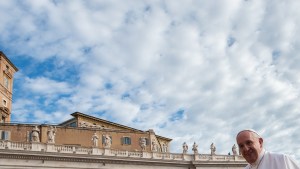Lenten Campaign 2025
This content is free of charge, as are all our articles.
Support us with a donation that is tax-deductible and enable us to continue to reach millions of readers.
“Martyrs in the Church are witnesses of the hope that comes from faith in Christ and incites to true charity. Hope keeps alive the deep conviction that good is stronger than evil, because God in Christ conquered sin and death.” This is what Pope Francis wrote in a letter in July 2023 that created the “Commission of New Martyrs – witness of faith” in light of the 2025 Jubilee. Modeled on a similar body created by John Paul II for the 2000 Jubilee, this commission within the Dicastery for the Causes of Saints has been gathering the stories of Christian martyrs in the 21st century across the world.
With this focus in mind, the Dicastery for the Causes of Saints held their annual academic conference on the theme “There is no greater love. Martyrdom and the Offering of Life” in Rome from November 11 to 14, 2024.
Bringing together academics, priests, nuns and more, the conference was an opportunity to delve into what drives hatred for the Catholic faith across the world and what it truly means to offer one’s life for Christ and for the Church.
On November 14, three academics and one journalist looked at what generates hatred against the faith, and thus leads to martyrs, in four different geographical and social contexts: Asia, Latin America, Europe, and Africa. Although the speakers highlighted many different aspects that results in the persecution of Christians in these different regions, one theme that remerged was how many Catholics are martyred due to their unwillingness to succumb to violent situations or unjust systems that violate human dignity and Christian ideals of charity and love.
Rebelling against ideological movements
Father Jan Mirkut, of the Pontifical Gregorian University, for example, spoke about various totalitarian and ideological systems that have brought martyrs in Europe.
“For the Church in Europe the 20th century was a painful period but also of glory,” he said. “The persecution of Christians […] caused on the one hand a large number of martyrs. On the other hand, the martyrs also demonstrate the great vitality of their faith.”
He spoke for example about Christians who opposed Nazism, fascism, or communism in Russia, Italy, Germany, Spain or Albania. He highlighted well known examples, such as St. Maximilian Kolbe (1894 – 1941), but also figures from other Christian churches such as the Orthodox Patriarch of Russia Tikhon of Moscow (1856 – 1925), who was not killed for his faith, but was heavily persecuted for opposing the new Soviet state.
Pope Francis’ Jubilee commission in fact also studies martyrs and witnesses of faith from other Christian non-Catholic religions.
Not succumbing to violence and divisions
Similarly, Father Aimable Musoni, SDB, of the Pontifical Salesian University, identified sociopolitical issues as one of the themes that in Africa has generated hatred for the Catholic faith and thus led to many faithful dying for their ideals and beliefs.
He highlighted the Rwandese married couple and Servants of God, Cyprien (1935–1994) and Daphrose Rugamba (1944–1994), who opposed ethnic divisions and were killed in 1994 during the Rwandan genocide. Or also Jesuit Archbishop Christophe Munzihirwa Mwene Ngabo (1926 – 1996) of Bukavu, Democratic Republic of Congo, who strongly opposed the violence during the First Congo War and is nicknamed by many as the “Oscar Romero of the Congo.”
“These Servants of God whose cause is ongoing were recognized for their courageous defense of human rights and their pursuit of justice, of reconciliation, of peace in their respective countries,” emphasized Father Musoni.
A tireless defense of human rights
Professor Gianni La Bella, of the University of Modena, and Reggio Emilia also highlighted the strong defense of human rights and dignity that leads to the martyrdom of many Latin American Catholics, focusing his speech on the period from 2000 to today. He especially emphasized how the Church in Latin America has often been the only place of refuge for populations faced with failing state systems, poverty, and gang violence.
Professor La Bella mentioned the recent murder of Mexican Father Marcelo Pérez (1973 – 2024), on October 20, 2024, who was known for his “tireless dedication to the ministry of peace and justice” against organized crime. Or also the murder of Archbishop Isaías Duarte Cancino of Cali, Colombia, (1939 – 2002), who strongly criticized the local drug cartels, guerrilla groups, and corrupt authorities.
Professor La Bella also mentioned an interesting category of Catholics who he believes should be looked into, which are those who “freely and consciously gave up their lives” by serving charitably those who were affected by the COVID-19 pandemic. He underlined how structural issues such as socioeconomic inequalities, lack of accessible healthcare, informal employment, and other such issues resulted in Latin America being particularly affected by the pandemic. He explained that the Church was on the front lines, citing several priests and nuns who passed away from COVID-19, after refusing to stop caring for disadvantaged people or elderly who were affected by the virus.
A quiet and strong witness
Journalist Paolo Affatato, head of the Asia section of Fides, the media outlet of the Pontifical Missions Societies, explained how martyrs in this continent in the last 25 years were often killed while simply living out their faith. This is because Catholicism is a religion which in many parts of Asia has been and may still be seen as “foreign” and “alien” and thus be “rejected from the outset,” he explained. Even just announcing the Gospel in certain areas could be considered as “proselytism” and cause “hostility, violence, persecution or even be outlawed.”
Affatato said that Asian Catholics’ strong witness lies in their ability to “sow the gospel in full harmony, not in conflict, let alone in disregard, of local cultures.” He highlighted, however, that even in places where Christians encounter the most difficulties, he notices they live their faith with “authenticity, depth and radicality.”
Affatato praised the strength of the faith in Pakistan, for example, and highlighted the story of the Servant of God Akash Bashir (1994 – 2015), who could eventually become the country’s first saint. He was a 20-year-old man who died when he blocked a suicide bomber from entering his church in Lahore in March 2015.
The journalist also mentioned the example of the “so-called ‘Church of Silence'” in North Korea, formally an atheist state. It is “a community made up of hidden Christians […] people who do not let the glow of the Holy Spirit be extinguished, and keep the fundamentals of the faith in their hearts, even though they do not have the freedom to profess that they are disciples of Jesus.”






